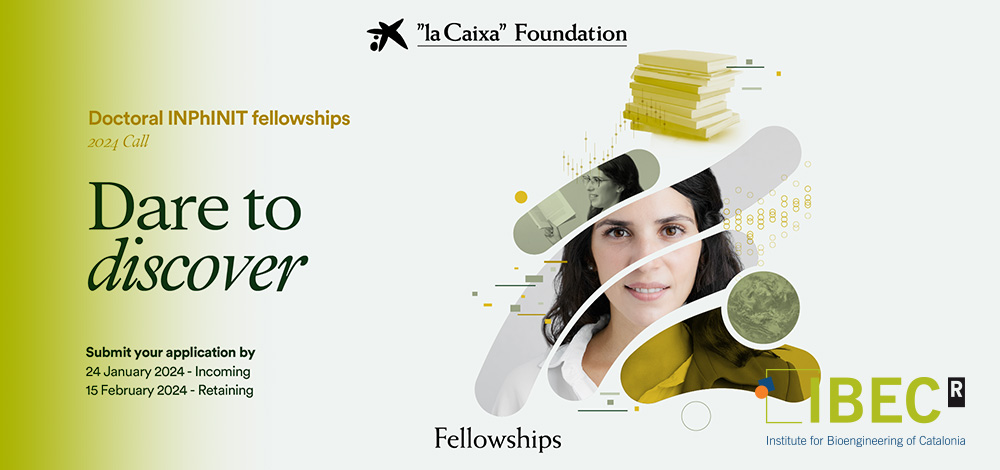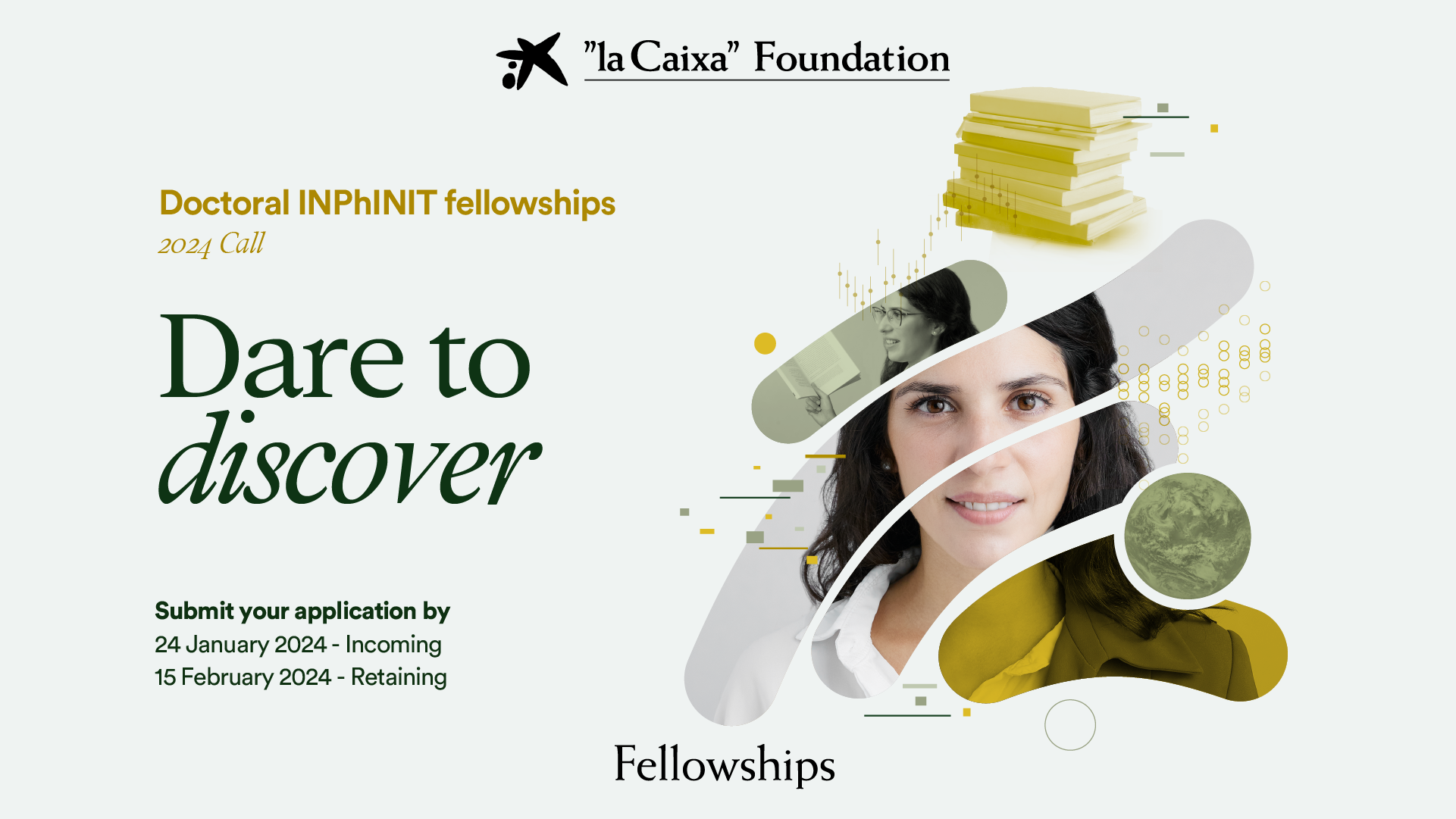CLOSED FOR APPLICATIONS

ABOUT
”la Caixa” Foundation grants 30 fellowships for researchers of any nationality who wish to pursue a doctorate in a STEM discipline at research centres of excellence in Spain or Portugal. This fellowships programme is aimed at supporting the best scientific talent and fostering innovative and high-quality research in Spain and Portugal by recruiting outstanding international students and offering them an attractive and competitive environment for conducting research of excellence.
30 doctoral fellowships for researchers who wish to carry out their doctoral project at a Spanish research centre accredited with the Spanish Seal of Excellence Severo Ochoa, María de Maeztu or the Carlos III Health Institute, and Portuguese centres accredited as «excellent» according to the evaluation of the Fundação de Ciência e Tecnologia.
The call for applications is intended for the pursuit of a doctoral degree in the fields of technology, engineering, physics, mathematics, life and health sciences and is aimed at individuals who fulfil the requirements to be admitted into a doctoral degree programme, provided that they also fulfil the mobility requirements and that they have not previously enrolled in the doctoral studies applied for.
| IBEC is one of the top research institutions named twice as a Severo Ochoa Research Centre by the Ministry of Economy and Competitiveness (in charge of research and innovation policy in Spain), which recognizes excellence at the highest international level in terms of research, training, human resources, outreach and technology transfer. IBEC has also received the ‘Human Resources Excellence in Research’ seal from the European Commission, in recognition of its commitment to continuously improving its HR policies in line with The European Charter of Researchers and The Code of Conduct for the Recruitment of Researchers. IBEC aims to train the next generation of researchers in bioengineering for future medicine, regenerative therapies and active ageing. Thanks to IBEC’s interdisciplinarity, the most recent technical and technological approaches developed for research in biology and the biomedical sciences are available. Young researchers can acquire experience and practical training day-to-day in both the classical approaches and new methodologies in imaging techniques, nanomaterials technology, nanofabrication, biosensors, biosignal interpretation, lab-on-a-chip approaches, and many more. |
| ”la Caixa” is a non-profit entity whose activity in education is based on the principle of promoting equal access of citizens to quality qualifications and specializations at national and international levels. Over the years, thousands of students have advanced their training thanks to a ”la Caixa” Foundation fellowship, enabling them to undertake postgraduate studies in Spain and abroad. |
OPEN PROJECTS
Open PhD positions at IBEC
Please feel free to contact our group leaders. They will happy to answer your questions.
| PROJECT: Defining the spinal cord injury matrisome to design more effective experimental treatments Group leaders: Zaida Alvarez Pinto (Samuel I. Stupp), Institute for Bioengineering of Catalonia (IBEC) · zalvarez@ibecbarcelona.eu Elisabeth Engel Lopez, Institute for Bioengineering of Catalonia (IBEC) · eengel@ibecbarcelona.eu |
| PROJECT: Anticipation of respiratory outcomes in Acute Respiratory Distress Syndrome patients by clinical and metabolic signatures Group leaders: Santiago Marco, Institute for Bioengineering of Catalonia (IBEC) · smarco@ibecbarcelona.eu Joan Ramón Masclans, Hospital del Mar · jrmasclans@psmar.cat |
| PROJECT: Nuclear mechanotransduction in intestinal organoids Group leaders: Xavier Trepat, Institute for Bioengineering of Catalonia (IBEC) · xtrepat@ibecbarcelona.eu Pere Roca-Cusach, Institute for Bioengineering of Catalonia (IBEC) · proca@ibecbarcelona.eu |
| PROJECT: Design and assessment of antimalarial multivalent nanodrug Group Leader: Xavier Fernández Rodríguez-Busquets, Institute for Bioengineering of Catalonia (IBEC) · xavier.fernandez@isglobal.org César Rodriguez-Emmenegger, Institute for Bioengineering of Catalonia (IBEC) · crodriguez@ibecbarcelona.eu |
| PROJECT: Massively parallel screening of small molecules modifiers of amyloid nucleation in Alzheimer’s Disease Group Leaders: Benedetta Bolognesi, Institute for Bioengineering of Catalonia (IBEC) · bbolognesi@ibecbarcelona.eu |
| PROJECT: Multimodal magnetic resonance investigations of cortical responses and therapeutic applications of photoswitchable drugs Group leaders: Irene Marco, Institute for Bioengineering of Catalonia (IBEC) · imarco@ibecbarcelona.eu Pau Gorostiza, Institute for Bioengineering of Catalonia (IBEC) · pau@icrea.cat |
| PROJECT: Mimicking emerging phenomena of living organisms by chemically motile protocells Group leaders: Samuel Sánchez, Institute for Bioengineering of Catalonia (IBEC) · ssanchez@ibecbarcelona.eu Jan van Hest, Institute for Complex Molecular Systems at the Technical University of Eindhoven · j.c.m.v.hest@tue.nl |
| PROJECT: Muscle-on-chip devices for monitoring fibrotic processes in muscular dystrophies Group leaders: Juanma Fernández Costa, Institute for Bioengineering of Catalonia (IBEC) · jfernandez@ibecbarcelona.eu Javier Ramón, Institute for Bioengineering of Catalonia (IBEC) · jramon@ibecbarcelona.eu |
| PROJECT: Microfluids oxygenator for artificial placenta Group leaders: Josep Samitier, Institute for Bioengineering of Catalonia (IBEC) · jsamitier@ibecbarcelona.eu |
| PROJECT: Design of a biomimetic organ-on-chip device to study endometrial cell migration in the context of endometriosis. Group leaders: Elena Martinez, Institute for Bioengineering of Catalonia (IBEC) · emartinez@ibecbarcelona.eu Samuel Ojosnegros, Institute for Bioengineering of Catalonia (IBEC) · sojosnegros@ibecbarcelona.eu |
LIFE AT IBEC
Living with us: Training, mobility and social activities
IBEC encourages its PhD students to participate in various activities, such as workshops, discussions and outreach events, in order to develop themselves as international researchers.
| IBEC Seminars and PhD Discussions IBEC provides Seminars with top names in bioengineering and nanomedicine from all over the world in order to offer the opportunity to discuss and network the developments. At the same time IBEC provides PhD discussions, Training for specially devoted for PhD and early postdocs such workshops to prepare the thesis and presentation skills. IBEC also offers different courses to give the opportunity to learn new skills such a leadership communication, time management, and language skills. The institute also holds an annual symposium on a different scientific theme, as well as hosting and organizing several other project-based or general scientific meetings and workshops throughout the year. |
| Practical training Thanks to IBEC’s interdisciplinarity, the most recent technical and technological approaches developed for research in biology and the biomedical sciences are available at the institute. PhD students can acquire experience and practical training in both the classical approaches and new methodologies in imaging techniques, nanomaterials technology, nanofabrication, biosensors, biosignal interpretation, lab-on-a-chip approaches, and many more. |
| Complementary skills training Besides the mandatory doctoral courses offered by the universities, IBEC offers several training courses specifically devoted to PhD students and early postdocs, covering such topics as Scientific writing, Effective communication, Leadership, Guidance for women in their research, How to publish in high ranking journals, Preparing a PhD thesis, Presentation skills in English, Career development, Diversity and cross-cultural awareness in research, Entrepreneurship or Technology transfer. All courses in complementary and transferrable skills are designed to enhance future employability and career progress. |
| Outreach activities As part of its mission, IBEC aims to inform society about the research being carried by its scientists in bioengineering and nanomedicine, both to help citizens understand the importance of research and make informed decisions, and to encourage young people to consider scientific careers. To do this, the institute organizes or takes part in a range of outreach activities throughout the year. IBEC’s PhD students are required to volunteer for these activities, as they offer the perfect opportunity to gain experience in explaining your research in terms that a lay audience can understand, a skill that is essential for your career in areas such as achieving funding for projects. IBEC’s outreach activities include group visits from schools, universities and other organizations, one-on-one mentoring, workshops for teachers, science fairs and festivals, talks in public spaces, Open Doors days, and many more. |
| Research Placements As part of their training, young researchers are encouraged to take up research placements in other centres. Thanks to these stays, students benefit from intense transnational and multidisciplinary mobility, as well as the expertise and facilities of the best institutions worldwide. Such mobility provides them with multicultural skills, including languages, and proves highly beneficial in crossing cultural borders and enhancing their future employability in a globalised job market. Placements take place in any of the many institutions with which our researchers collaborate, including but not restricted to centres linked to IBEC by strategic research agreements or funded exchange programmes such as Marie Curie or the Networks of Excellence. These stays have the added value of enabling PhD students to obtain an international PhD, a recognised distinction which significantly improves their chances of a successful career. |
| IBEC PhD Students’ Committee The PhD Students’ Committee is a group of highly motivated representatives of different research groups at IBEC, mainly graduate students, that work voluntarily with two major aims: to be the voice of the PhD students inside the institute, and to improve the PhD experience. The Committee works jointly with IBEC’s support service units to organize workshops, courses and seminars in response to the PhD community’s needs and requests. Social and sports activities where students can relax and mingle with others, such as bowling, tennis table and beach volley, are held frequently too. The representatives of the Committee convene regularly with HR and the Directorate to organize all these activities, as well as to pass on ideas and suggestions from the young IBEC community. |
ELIGIBILITY
Eligibility
The INPhINIT programme will be open to Early-Stage Researchers (ESR) of all nationalities. In order to be accepted, candidates must meet the following eligibility requirements:
- Experience: candidates must not have carried out more than four years of research activity before the closing date of the call.
- Studies pursued: at the time of recruitment, candidates must have completed the studies that allow them to enrol in an official PhD programme in Spain/Portugal. The verification of the required level of studies will be carried out by the host university when the admission procedure begins.
Candidates must not have been enrolled in a doctoral programme prior to the start of the fellowship. - Mobility: candidates must not have resided or carried out their main activity (work, studies, etc.) in Spain/Portugal for more than twelve months in the three years immediately preceding the closing date of the call.
- Level of English: candidates must accredit the required level of English by submitting one of the certificates specified in the rules for participation.
HOW TO APPLY
How to apply
You can apply for a Doctoral INPhINIT fellowship through ”la Caixa” Foundation’s fellowship application website.
If you have any further questions please contact phd@ibecbarcelona.eu.

IBEC is committed to the principles of the Code of Conduct for the Recruitment of Researchers of the European Commission. Thus, there are no restrictions of citizenship or gender and candidates with disabilities are strongly encouraged to apply.
This project has received funding from the European Union’s Horizon 2020 research and innovation programme under the Marie Sklowdowska-Curie grant agreement No. 713673
KEY DATES
Useful dates
No projects or additional documentation can be presented outside the deadlines established in the rules of the call for applications.
End: 24 January 2024, at 2 pm Peninsular Spain
Shortlisting results and call for interviews: 15 April 2024
Selection interviews 27, 28 and 29 May 2024
Final result: 7 June 2024
Host organisation-fellow agreement: from 7 to 30 June 2024
If you have any further questions, or if there are particular issues you’d like to discuss regarding your potential PhD project, please contact phd@ibecbarcelona.eu
For details of the grant, applications and selection criteria process, and other general questions, please visit the INPhINIT programme website.

